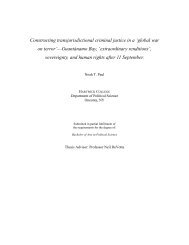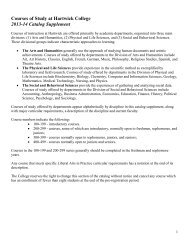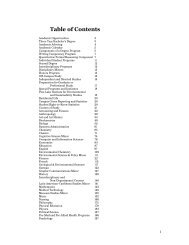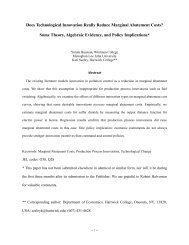Table of Contents - Hartwick College
Table of Contents - Hartwick College
Table of Contents - Hartwick College
Create successful ePaper yourself
Turn your PDF publications into a flip-book with our unique Google optimized e-Paper software.
Environmental Chemistry<br />
<strong>Hartwick</strong> <strong>College</strong> <strong>of</strong>fers an American Chemical Society (ACS) approved<br />
B.S. degree in Environmental Chemistry. The word environment in its<br />
broadest sense means an individual’s or community’s surroundings.<br />
Environmental chemistry is thus the study <strong>of</strong> the composition and<br />
changes in composition <strong>of</strong> our surroundings. Environmental chemistry<br />
applies chemistry to a wide variety <strong>of</strong> situations including, but not limited<br />
to, the broad categories <strong>of</strong> natural water, air, and soil chemistry; water,<br />
air, and soil pollution; pollution remediation; water, waste water, air, and<br />
hazardous waste treatment; pollution prevention (also known as green<br />
chemistry); toxicology; and resource availability and use. Some specific<br />
issues you may be familiar with that fall under these broad categories<br />
include ozone depletion, global warming, indoor air pollution, availability<br />
and use <strong>of</strong> fossil fuels, alternative energy sources, acid rain, and many<br />
others.<br />
Requirements for a major in Environmental Chemistry include courses in<br />
biology and/or geology as well as in chemistry and auxiliary courses in<br />
math and physics. A required senior research project involves laboratory,<br />
library, and possibly field work, interpretation <strong>of</strong> data, and oral and<br />
written reports <strong>of</strong> the results.<br />
In addition to the independent research required for their senior project,<br />
environmental chemistry majors <strong>of</strong>ten collaborate with faculty on ongoing<br />
research and/or complete internships with state and federal agencies,<br />
environmental consulting firms, or other universities.<br />
<strong>Hartwick</strong>’s major in Environmental Chemistry prepares students for<br />
entry-level positions in consulting firms, industry, state and federal<br />
government agencies, and research laboratories or for entry into graduate<br />
school to pursue a master’s or doctoral degree.<br />
Faculty<br />
Meredith E. Newman, coordinator; Richard L. Benner<br />
Courses<br />
315 Environmental Chemistry (3 credits) (3 one-hour lectures<br />
weekly). This course examines the transport, reactions, and effects <strong>of</strong><br />
chemical species in aquatic, terrestrial and atmospheric environments.<br />
Topics will include the application <strong>of</strong> chemical principles to current<br />
environmental problems such as: acid precipitation, water pollution and<br />
treatment, hazardous waste treatment, soil chemistry, pesticide behavior,<br />
global warming and photochemical smog formation. Prerequisite: Chem<br />
108 or 109. (LAB)<br />
316 Environmental Chemistry Lab (2 credits) (1 four-hour<br />
laboratory weekly). The laboratory introduces basic procedures in<br />
environmental monitoring (air, water and soil sample collection and<br />
analysis). The laboratory must be taken concurrently with 315<br />
Environmental Chemistry.<br />
121
















